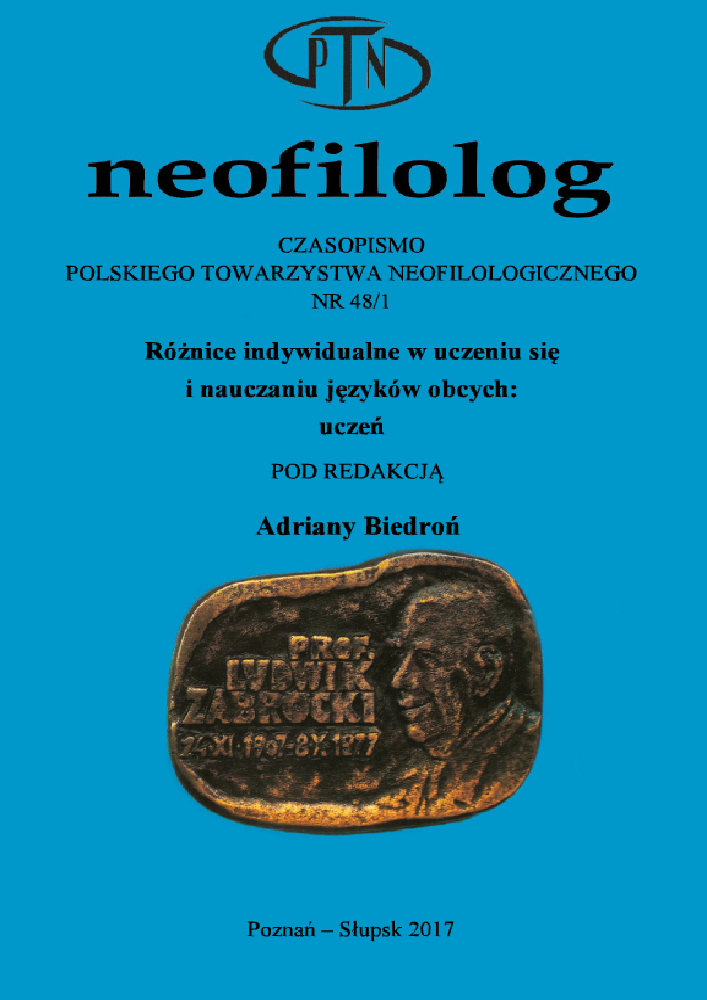Abstract
Research on subjective (implicit) theories, similarly to studies on other kinds of beliefs, has a rich tradition in the SLA field. This study presents the results of a survey conducted among 55 Romance Philology students, containing open-ended questions about different aspects of the language learning process: nature of the language itself, learner's personal attributes facilitating learning, effective learning activities, optimal learning environment, obstacles to learning, role played by other people. Due to the use of a qualitative methodology (open-ended questions), a large variety of different answers was collected. The data were analysed and divided into subject categories, and the answers falling into each category were counted in order to provide an overall view of the group's tendencies. The students' answers mainly confirm that they see learning a language as a long process demanding time and effort. Students' motivation and perseverance prove to be the most important factors whereas features such as intelligence or language aptitude are underestimated.
Literaturhinweise
Arnold, J., Brown, H. D. 1999. „A map of the terrain”. (w) Affect in language Learning. (red. J. Arnold). Cambridge: Cambridge University Press, str. 1-24.
Barcelos, A. M. F. 2003. „Researching Beliefs About SLA: A Critical Review”.(w) Beliefs about SLA. (red. P. Kalaja i A. M. F. Barcelos). Dordrecht: Springer, str. 7-33.
Biedroń, A. 2008. Attribution related affects in second language acquisition. Słupsk: Akademia Pomorska.
Blackwell, L. S., Trzesniewski, K. H., Dweck, C. S. 2007. „Implicit theories of intelligence predict achievement across an adolescent transition: A longitudinal study and an intervention”. Child Development, 78(1): 246-263.
Dörnyei, Z. 2005. The Psychology of the Language Learner. Individual Differences in Secod Language Acquisition. New Yersey – Londyn: Laurence Erlbaum Associates, Publishers Mahwah.
Dweck, C. S., Chiu, Ch., Hong, Y. 1995. „Implicit Theories and Their Role in Judgments and Reactions. A World From two Perspectives”. Psychological Inquiry, 6, 4: 267-285.
Horwitz, E. K. 1988. „The beliefs about language learning of beginning university foreign language students”. Modern Language Journal, 72(3): 283-294.
Kalaja, P. i A. M. Ferreira Barcelos. (red.). 2003. Beliefs About SLA. New Research Approaches. Dordrecht: Kluwer.
Kelly, G. A. 1955. The psyhology of personal constructs. New York: Norton.
Kuntz, P. S. 1996. Beliefs about language learning: the Horwitz model, University of Wisconsin-Madison, http://files.eric.ed.gov/fulltext/ED397649.pdf, DW 08.12.2016.
Martinez, H. 2008. „The subjective theories of student teachers: Implications for teacher education and research on autonomy”. (w) Learner and Teacher autonomy. (red. T. Lamb i H. Reinders). Amsterdam: Benjamins, str. 103-124.
Michońska-Stadnik, A. 2013. Teoretyczne i praktyczne podstawy weryfikacji wybranych teorii subiektywnych w kształceniu nauczycieli języków obcych. Wrocław: Wydawnictwo Uniwersytetu Wrocławskiego.
Mori, Y. 1999. „Epistemological beliefs and language learning beliefs: What do language learners believe about their learning?” Language Learning, 49 (9): 377-415.
Pudo, D. 2016. „Représentations du français et d’autres langues étrangères chez les étudiants de philologie romane”. Romanica Cracoviensia, 16 (4): 249-263.
Rubacha, K. 2008. Metodologia badań nad edukacją. Warszawa: Wydawnictwa Akademickie i Profesjonalne.
Ryan S., Mercer, S. 2012. „Implicit Theories: Language Learning Mindsets”. (w) S. Mercer, S. Ryan i M. Williams (wyd.) Psychology for Language Learning, Palgrave Macmillan: 74-89.
Smuk, M. 2016. Od cech osobowości do kompetencji savoir-être – rozwijanie samoświadomości w nauce języków obcych. Lublin – Warszawa: Werset.
van der Slik, F. W. P., van Hout, R. W. N. M., Schepens, J. J. 2015. „The Gender Gap in Second Language Acquisition: Gender Differences in the Acquisition of Dutch among Immigrants from 88 Countries with 49 Mother Tongues”. PLoS ONE 10(11): e0142056. https://doi.org/10.1371/journal.pone.0142056, DW 08.08.2017.
Wilczyńska, W., Michońska-Stadnik, A. 2010. Metodologia badań w glottodydaktyce. Wprowadzenie. Kraków: Avalon.
Lizenz
Copyright (c) 2017 Dorota Pudo

Dieses Werk steht unter der Lizenz Creative Commons Namensnennung - Keine Bearbeitungen 4.0 International.
Autoren:
Die Autoren der zur Veröffentlichung in der Zeitschrift Neofilolog angenommenen Texte sind verpflichtet, den Vertrag über die Erteilung einer kostenlosen Lizenz für die Werke mit der Verpflichtung zur Erteilung einer Sublizenz CC auszufüllen, zu unterzeichnen und an die Adresse der Redaktion zurückzusenden.
Gemäß Vertrag erteilen die Autoren auf die in der Zeitschrift Neofilolog veröffentlichten Texte der Adam-Mickiewicz-Universität in Poznań eine nicht exklusive und kostenlose Lizenz und erlauben die Verwendung der Sublizenz Creative Commons Attribution-NoDerivatives 4.0 International (CC BY-ND 4.0).
Die Autoren behalten das Recht zur weiteren freien Verfügung über das Werk.
Benutzer:
Interessierte Onlinebenutzer dürfen die seit 2017 veröffentlichten Werke unter folgenden Bedingungen nutzen:
- Anerkennung der Urheberschaft - die Verpflichtung, zusammen mit dem verbreiteten Werk Informationen über die Urheberschaft, den Titel, die Quelle (Links zum Originalwerk, DOI) und die Lizenz selbst bereitzustellen;
- ohne Schaffung abgeleiteter Werke - das Werk muss in seiner ursprünglichen Form erhalten bleiben, ohne Zustimmung des Autors dürfen keine Studien, beispielsweise Übersetzungen, verbreitet werden.
Die Urheberrechte aller veröffentlichen Texte sind vorbehalten.
Sonstige:
Die Adam-Mickiewicz-Universität in Poznań behält das Recht auf die Zeitschrift als Gesamtheit (Layout, Grafik, Titel, Umschlagsprojekt, Logo usw.).
